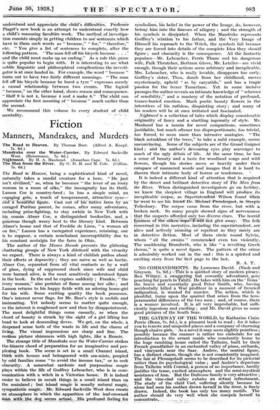Fiction
Manners, Mandrakes, and Murders Mandrake over the Water-Carrier. By Edward Sackville West. (Heinemann. 7s. 6d.) The Road • to Heaven', being a sophisticated kind of novel, naturally takes a candid creature for a hero. " He -just isn't civilized," so, when he becomes " the lover of an ivory woman in a room of silks," the incongruity has its thrill.
Lamon Coe is country-bred ; he has a simple mind, an engaging grin, a touch of teniperament, attractive eyes- Cast out farm by `an_'.
enraged Puritan parent, he comes, after many, adventures, including prize-fighting, to stay awhile in New York with his cousin -Abner Coe, a distinguished bookseller, and. geheious though weary host-to the literary kind. -BetWeen Abner's house and that of Freddie de Lima, " a woman all on fire," Lamon has a variegated experience, retaining, one is to suppose, a certain nonchalant incorruptibility due to his constant nostalgia for the farm in Ohio.
The author of the Mauve Decade presents the glittering chattering' groups, of 'New- York dilettanti with the vivacity we expect. There is always a kind of childish pathos about their efforts at depravity.; they are naive as well as hectic. Abner Coe, separated from all- vital contacts as by a wall of glass, dying of suppressed shock since wife and child were burned alive, is the most sensitively understood figure in the book. In the end he expires suddenly ; Frankie, " the ivory woman," also perishes of flame among her silks ; and Lamon returns to his happy fields with an adoring home-girl for his wife. Some exciting quality the book possesses. One's interest never flags, for Mr. Beer's style is mobile and insinuating. Yet nobody seems to matter quite enough, so the interest is roughened now and then by disappointment. The most delightful things come casually, as when the chord of beauty is struck by the . sight of a girl lifting her head to look at descending doves. We get, on the whole, a deepened sense both of the waste in life and the charm of living. The visual impressions are sharp and fine. The restless picture shinuriers with high lights, like -a Renoir.
The strange title of Mandrake over the Water-Carrier strikes they bizarre chord of preparation for an imaginative and per- plexing book. The scene is set in a small Channel island, thick with houses and beleaguered with sea-mists, peopled by odd families come " to avoid the income tax," or to seek obscurity. A somewhat- sardonic and- purposeless - magic plays within the life of Godfrey Leboucher, who is in coni-. munication with a witch in a Victorian house. It is indeed easier to believe in occult things. in a small island than on the mainland ; but island magic ie usually natural magic, sympathetic magic. Mr. Edward Sackville West does create an atmosphere in which the apparition of the leaf-crownel 816n with the dog seems actual. His profound -feeling fok- symbolism, his belief in the power of the Image, do, however, betray -him• into the finesses of allegory ; and the strength of • his symbols -is _dissipated. When the iMandrake represents -,Godfrey'srelatidiCto his father, andtha*-Very Image of Himself his reproach to the Witch, the symbols fail because they are forced into details of the complete Idea they should figure ;. and obseurity is the consequence. All the fantastic populace—Mr. Lehouch.er, Ferris Thune and his dangerous wife, Fulk Thrutche,r, Bertram Glove, Mr. Leteller—are vivid enough, though their actions seem arbitrary and inexplicable. Mrs. Leboucher, who is really loVable, disappeard too early. Godfrey's sister, . Thea, dumb from her childhood, moves mysteriously, upheld " as by caryatids," and has a tragic, `passion for the boxer Tamerlane.. Yet in ' some incisive passages the author reveals an intimate knowledge of " schemes of sensibility," and a mastery of the notation Of profound, trance-buried emotion. Much poetic. beauty flowers in the interstices of his ruthless, disquieting story ; and many of his readers will be at once irritated and fascinated.
Nightseed is a collection of tales which display considerable -originality-of fancy and a startling ingenuity of style. • Mr. -hfariliond has a mania for novel comparisons, sometimes justifiable, but- much oftener too disproportionate, too trivial, too forced, to seem more than intrusive analogies. " The 'black astrakhan-of the treei," to take a mild example, seems unconvincing. Some of the subjects are of the Grand Guignol kind ; and the authefa devouring eyes .play scavenger to much of the ugly debrii of life. At the same time, he has a sense of beauty and a taste for--woodland songs and wild flowers, though his stories. move so heavily under . their carapace of mannered words -and images that it is hard. to discern their intimate body of horror or tenderness.
It is indeed a different kind of attention that is required by the direct and brilliant detective story of -The Man from the River. When distinguished investigators io on holiday, we knovi the. sleepiest village in England will produce, its inexplicable' _corpse, as Siiperintenffent Wiison found When 'lie-went to-See-his frienit Dr: MichaePPrendergast in • Steeple Tollesbury. The corpse came from the river, but with a broken neck. So many people showed signs of nervousness that the suspects afforded only too diverse clues. The horrid sines away --The folk • Soncerned. in this narrativ.e,.includiag thesuperintendent, ani alive and actively oi:" repellent as' they 'rarely are in detective "fiction. Most of theM circle round Sylvia; whom " all the. swains " commended even too violently: . The maddening Brandreth, who is like " a revolting Greek chorus," is quite a novel figure. The pattern of the crime is admirably worked -out in the end : this is a spirited and exciting story from the' first page to the last.
R. A. T. -








































 Previous page
Previous page